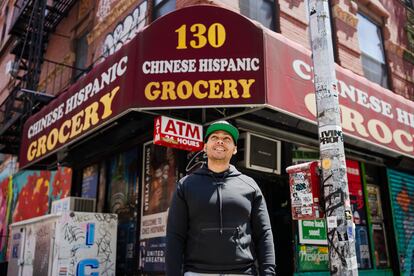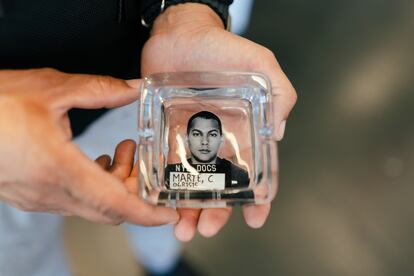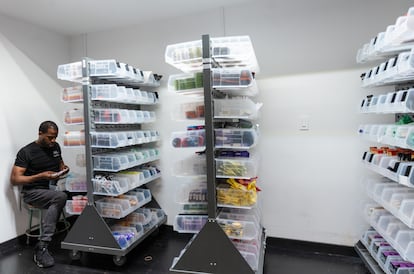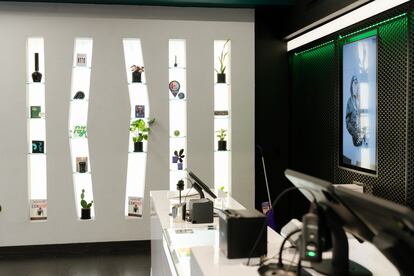From the corner to a dispensary: Formerly incarcerated Latinos make their way in New York’s cannabis industry
94% of the state’s dispensaries are owned by justice-involved individuals, particularly Latinos and Black people, who bore the brunt of the war on drugs


The first time a cop slammed Coss Marte’s face into a sidewalk, he was 13 years old. It was the 1990s on the Lower East Side, a neighborhood on the south side of Manhattan that was awash with drugs — and cops — during those years. Marte had just sold two small bags of weed to his friend and they were walking down the street, talking and smoking, when the police detained them. “I wasn’t scared,” he recalls. That arrest — the first of “ten in all” — marked the beginning of a decade-long career as a marijuana and cocaine dealer. A multimillion-dollar business that put him in the DEA’s crosshairs and, at 23, landed him in prison for four years.
Today, just three blocks from the corner where he was first arrested more than two decades ago, Marte sells marijuana legally. He has been doing so since October of last year, when he opened ConBud, his own cannabis dispensary. It is one of 132 currently operating in New York, after the state legalized recreational marijuana use in March 2021. ConBud exists thanks to a state cannabis licensing program geared toward individuals who have previously been convicted of marijuana-related offenses. These licenses — called CAURD — are reserved for applicants from “communities disproportionally impacted by the enforcement of cannabis prohibition,” the vast majority of whom are Black and Latino. Regarding the latter, the law signed in 2021 even specifies some nationalities: “Hispanic persons of Mexican, Puerto Rican, Dominican, or Cuban” origin.
They’re second chances for people like Marte, who suffered firsthand the abuses committed during the war on drugs when, at the end of the last century, authorities focused their efforts on marijuana possession and distribution. Like him, thousands of Latinos were arbitrarily detained because of their skin color and appearance, and incarcerated. In New York City alone, between 1997 and 2006, 112,000 Latinos were arrested for possessing small amounts of marijuana. That figure accounts for 31% of weed-related arrests made during that period, even though, back then, Latinos only made up 27% of the city’s population, according to data from the ACLU of New York. Marte was one of them.

From the corner to making a million dollars a year
Marte, whose mother emigrated from the Dominican Republic when she was pregnant with him, was born and raised in a Lower East Side ruled by the owners of the corners where the drugs were sold. By the time he was 11, he was already smoking marijuana. “So many people made so much money selling drugs over here. It was clockwork. There were multimillion-dollar corners, where people lined up to buy stuff, and I lived on them. So as a kid, seeing 20 or 50 people lining up to buy was crazy. That’s what I thought success was,” says Marte. So, as a teenager, he says he “gave himself to the streets.”
He started out selling marijuana inside a neighborhood bodega at the intersection of Broome and Eldridge streets. Eventually, he inherited the corner from its previous owner and gave it his all. “I wouldn’t stop. I was on that corner 24 hours a day, I slept there,” he recalls. In the early 2000s, with the gentrification of the neighborhood, Marte saw his product go from selling “for $20 to almost $100.” His profits multiplied and the business took off.
He was no longer just selling on the corner of Broome and Eldridge; he was selling all over the city with his own home delivery service. Marijuana and cocaine on demand, 24 hours a day, seven days a week. He was getting so many orders that, at one point, he had seven cell phones to process them all: “The phones would not stop ringing. Sometimes I would take calls on two phones at the same time while two others were ringing.” At just 19, says Marte, he was already earning more than a million dollars a year.
Until 2009. In March of that year, Marte was arrested in the Bronx, in front of one of the three apartments he owned in the city. According to a report from New York City’s Office of the Special Narcotics Prosecutor, authorities had tapped one of his business phones as part of an investigation, and when they arrested him, he had that same cell phone on him. A search of his residence turned up approximately two pounds of cocaine, the report continues.

Marte was sentenced to seven years in prison, though he was released after four. That last arrest changed something in him. He realized he couldn’t keep going the way he was going. “I fell into the box. I was in solitary confinement, in a cell for 24 hours, alone. And that’s when I started thinking, you know? I read the Bible and changed my way of thinking,” he recalls. “I was also thinking of my son, who came to visit me. When I went to prison, he was almost 2 years old. When I got out, he was 6. I had to have another future for him, I didn’t want to go back to what I was doing before.”
While in prison, Marte also received a warning that would change his life completely. He was very overweight and prison doctors warned him that if he didn’t change his lifestyle, it could end up killing him. That’s how, while still behind bars, he devised a plan to lose weight and get in shape. In just six months he lost 70 pounds and began training other inmates. When he was released in March 2013, he professionalized the method and a year later officially launched ConBody, a prison-inspired, bootcamp workout program. In 2016, he opened a gym with the same name, where the ConBud dispensary is also located today.
Reparations
– After everything you went through, did you ever think you would end up selling weed legally?
– Hell, no.
Marte remembers that when he heard the city was going to offer cannabis licenses to former inmates like him, he thought, “This law was written for me, to give me a second chance.” One of the requirements to apply for a CAURD license was to have had a profitable business for at least two years, which he already had with the ConBody gym. So he applied for the license in 2022 and the following year received the green light to open ConBud.
According to data from the New York Office of Cannabis Management, the state received more than 900 applications for CAURD licenses between August 2022, when the application period opened, and September 2023. Since then, 463 applicants have been granted licenses or at least provisional authorizations. Of the 132 dispensaries in the state, 124, or 94% of them, are operating thanks to this program.
“I’m taking this as reparations for what I went through,” says Marte, now 39. More than a decade after his release, he now sells the same product for which he was arrested so many times. He admits that there are still times when he’s standing in the street, smoking a joint, and tries to hide it if a cop drives by. “I still feel that trauma,” he acknowledges. “Because we were persecuted for something that is now legal. But now we have the chance to really receive reparations, that’s how I see this opportunity,” he adds.

After his time in prison, Marte always knew that he wanted to give back to formerly incarcerated individuals like himself, who had fallen victim to the harshest decades of the war on drugs. That’s why his businesses, both the ConBud dispensary and the ConBody gym, are exclusively run by justice-involved people, be it former inmates or persons whose family members have had to interact with the criminal justice system in some way. “We want to convey that the streets don’t have to be a menace to society,” he explains. All of his employees are Latino, black or Afro-Latino. “None of them are going back to prison,” he says.
When asked about the kind of support formerly incarcerated individuals need when they are released and are searching for a second opportunity, like many of his employees, Marte pauses and sighs deeply before answering. The first answer he gives is, “It’s a lot.” He repeats the phrase three times to emphasize the magnitude of the help they need. He also knows this firsthand. “Everybody comes with different issues, whether it’s housing, children or parole. There are times when parole officers come and they want to check up on the whole location because an employee is on probation,” he says.
ConBud is a space of mutual support, where there can be no prejudice. “I always tell my employees that if they have any issues or if they’re thinking of doing something crazy, to call me. Or call the team, call someone,” says Marte. “It’s a process, but they all talk to each other. The ones who did 10 or 20 years are now mentoring the younger ones. And the younger ones teach them about social media and all that,” he says.

Breaking the cycle of incarceration
Fernando Peña, another CAURD licensee, sees these permits as a way to break the cycle of marijuana arrests and subsequent incarceration that for so many years plagued Latino and Black communities, in New York and across the country. “It was a system systematically built to destroy families and take away our opportunities,” he says. Now, in the era of regularization and legalization, “children will grow up with their fathers” instead of having to visit them in prison. “We are at the beginning of a new city, a different New York. I feel like there’s going to be a kind of renaissance, especially for people of color, who will now have more opportunities,” he adds.
In mid-April, Peña opened a dispensary in Ridgewood, Queens, called Late Bloomers, with his wife, Suzanne Furboter. They did so thanks to a CAURD license they received last year, just two decades after Peña was jailed for marijuana possession. The Dominican-American was arrested in 2003, when he was 35, in Chinatown, a Manhattan neighborhood not far from where Marte was first detained. He served a six-month sentence.
“It’s important that we are represented” in the cannabis industry, “especially because, for years, we caught a lot of heat for it just because of what we looked like,” Peña says. The owner of Late Bloomers is aware that opening a dispensary is not within everyone’s reach — both he and Marte had to pay a $2,000 non-refundable fee to apply for a CAURD license —, but he emphasizes that the legal cannabis industry is just getting started and the opportunities are immense. Not only in New York: there are already 24 states — accounting for 54% of the country’s population — that have legalized it recreationally. It is a market that this year alone will move more than $40 billion.
“In this neighborhood, many of the delivery truck drivers who pass through this street every day are probably Latinos, Dominicans,” Peña points out. “They could be working in the distribution service of some dispensary. It’s not just about owning a business. They could be working on the accounting side, the growing side, the processing side,” to just name a few.
Sign up for our weekly newsletter to get more English-language news coverage from EL PAÍS USA Edition
Tu suscripción se está usando en otro dispositivo
¿Quieres añadir otro usuario a tu suscripción?
Si continúas leyendo en este dispositivo, no se podrá leer en el otro.
FlechaTu suscripción se está usando en otro dispositivo y solo puedes acceder a EL PAÍS desde un dispositivo a la vez.
Si quieres compartir tu cuenta, cambia tu suscripción a la modalidad Premium, así podrás añadir otro usuario. Cada uno accederá con su propia cuenta de email, lo que os permitirá personalizar vuestra experiencia en EL PAÍS.
¿Tienes una suscripción de empresa? Accede aquí para contratar más cuentas.
En el caso de no saber quién está usando tu cuenta, te recomendamos cambiar tu contraseña aquí.
Si decides continuar compartiendo tu cuenta, este mensaje se mostrará en tu dispositivo y en el de la otra persona que está usando tu cuenta de forma indefinida, afectando a tu experiencia de lectura. Puedes consultar aquí los términos y condiciones de la suscripción digital.








































